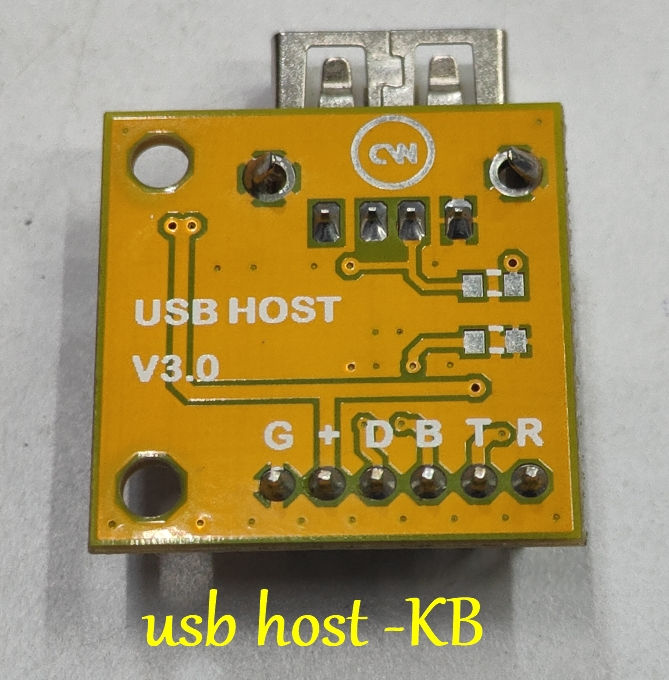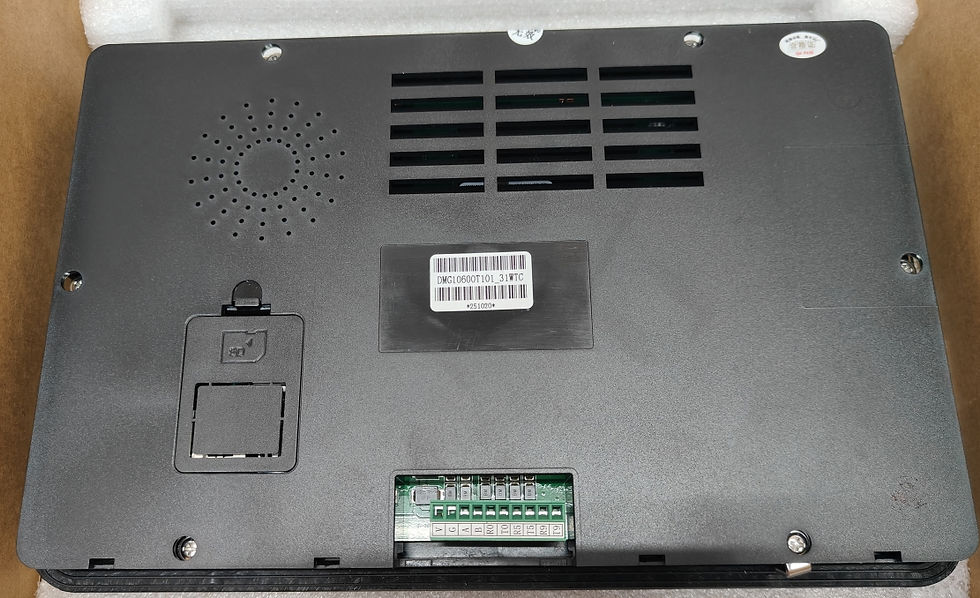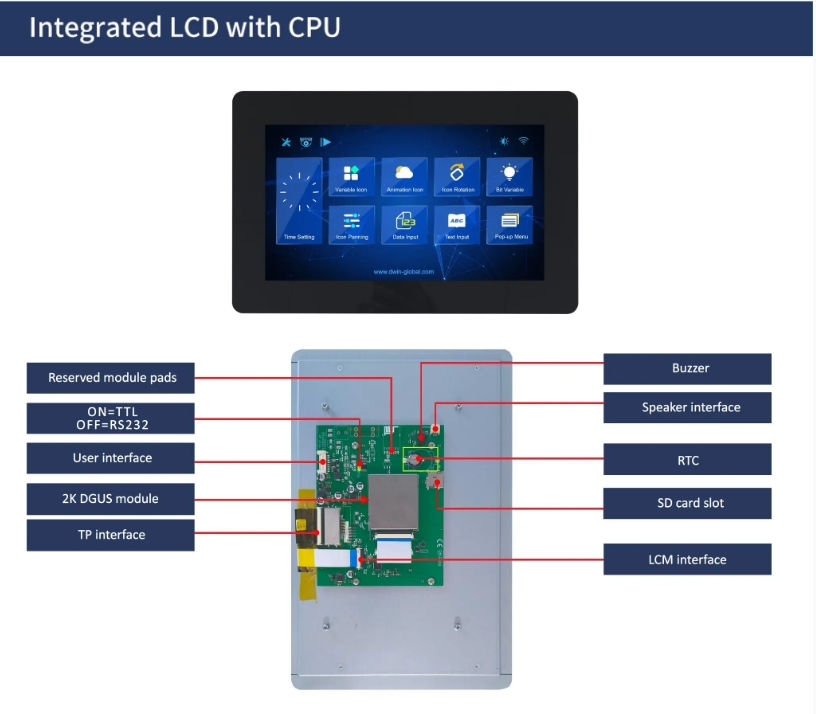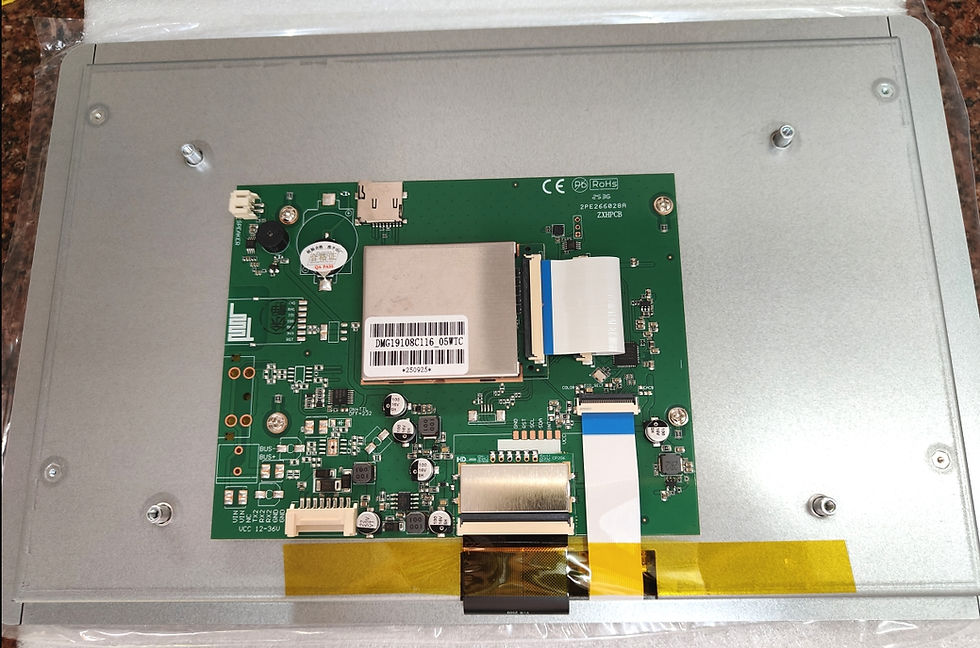Features:
● DWIN self-designed T5L0 ASIC, 262k colors ;
● Glass + glass structure Capacitive Touch screen;
● 2Pin_3.81 Socket connection wire, TTL Interface;
● Multiple user interfaces(I/Os, CAN, PWM, AD, UARTs) for debugging;
● SD card or on-line serial port by DGUS TOOL two ways are supported for project downloading;
● DWIN DGUS V7.6 GUIs Development, no coding skills required, being user friendly;
● Dual Development System: DGUS II(GUI tool with built-in UI modules)/ TA(Instruction set), switched by download the kernel via SD card;
● With GUI & OS dual-core, GUI with rich built-in touch and display controls in DGUS tool. DWIN OS kernel is open to the user for the second-development, via DWIN OS programming language or KEIL C51 language.
A 600Mhz dual core chip, GUI core and OS core, 1MBytes Nor Flash on the chip, 512KBytes used to store the user database. Rewrite cycle: over 100,000 times
Display
| Color | 262K colors |
| Display Area(A.A) | 93.60mm (W)×56.16mm (H) |
| Resolution | 480 x 800 |
| Backlight | LED |
| Brightness | 250nit |
Voltage & Current
| Power Voltage | 6~36V, typical value: 12V |
| Operation Current | VCC = 12V, Backlight on, 180mA |
| VCC = 12V, Backlight off, 110mA |
Interface
| Baudrate | 3150~3225600bps |
| Output Voltage | Output 1, Iout = 1mA;3.0~3.3 V |
| Output 0, Iout =-1mA;0~0.3 V | |
| Input Voltage | (RXD) Input 1, Iin = 1mA;2.4~5.0V |
| Input 0, Iin = -1mA;0~0.5V | |
| Interface | UART2: 232/TTL UART3: 232/TTL UART4: 485 UART5: 485 |
| Socket | 2Pin_3.81 Socket |
| SD slot | YES (SDHC/FAT32 Format) |
UI & Peripheral
| UI Version | TA / DGUSⅡ ( DGUSⅡ pre-installed ) |
| Peripheral | Capacitance touch screen, Buzzer,WIFI,voice function,HME05 simulator |
Memory
| Flash | Space of Font: 4-12Mbytes Picture Storage:12-4Mbytes |
| RAM | 128Kbytes |
| Nor Flash | 512Kbytes |
Dimension
| Dimension | 126.11(W) × 109.60(H) ×17.70(T) mm |
| Net Weight | 145g |
Interface Description
| 1# | SD card download interface |
| 2# | WIFI module interface |
| 3# | Connect to speaker |
| 4# | Option USB/WIFI, JTAG/IO P#35-38, GUI/OS JATG function with jumper. |
| 5# | JTAG interface, connect HME05 emulator, or connect PGT05 downloader to download the underlying kernel firmware |
| 6# | Pin of GUI/OS CPU with screen printing on the other side |
| 7# | USB power supply interface, option UART1 |
| 8# | LCD interface |
| 9# | 6-36V wide voltage power supply interface |
| 10# | Resistance/capacitance touch panel interface |
| 11# | Offline speech recognition module |
External Interface
| PIN | Definition | Description |
| 1# | P1.0 | I/O |
| 2# | P1.1 | I/O |
| 3# | P1.2 | I/O |
| 4# | P1.3 | I/O |
| 5# | P1.4 | I/O |
| 6# | P1.5 | I/O |
| 7# | P1.6 | I/O |
| 8# | P1.7 | I/O |
| 9# | P2.0 | I/O |
| 10# | P2.1 | I/O |
| 11# | P2.2 | I/O |
| 12# | P2.3 | I/O |
| 13# | P2.4 | I/O |
| 14# | P2.5 | I/O |
| 15# | P2.6 | I/O |
| 16# | P2.7 | I/O |
| 17# | P3.0 | I/O |
| 18# | P3.1 | I/O |
| 19# | P3.2 | I/O |
| 20# | P3.3 | I/O |
| 21# | ADC1 | AD |
| 22# | ADC0 | AD |
| 23# | ADC3 | AD |
| 24# | ADC2 | AD |
| 25# | PWM2 | PWM |
| 26# | ADC4 | AD |
| 27# | ADC6 | AD |
| 28# | ADC5 | AD |
| 29# | PWM1 | PWM |
| 30# | ADC7 | AD |
| 31# | PWM3 | PWM |
| 32# | PWM0 | PWM |
| 33# | RX3/232 | 232 |
| 34# | TX3/232 | 232 |
| 35# | RX3/TTL | TTL |
| 36# | TX3/TTL | TTL |
| 37# | TX2/232 | 232 |
| 38# | RX2/232 | 232 |
| 39# | TX2/TTL | TTL |
| 40# | RX2/TTL | TTL |
| 41# | GND | GND |
| 42# | GND | GND |
| 43# | UART5/485B | 485 |
| 44# | UART5/485A | 485 |
| 45# | UART4/485B | 485 |
| 46# | UART4/485A | 485 |
| 47# | CANH | CAN |
| 48# | CANL | CAN |































